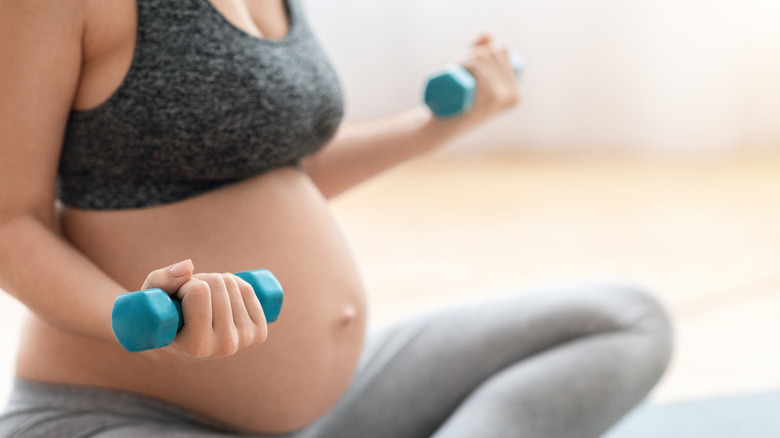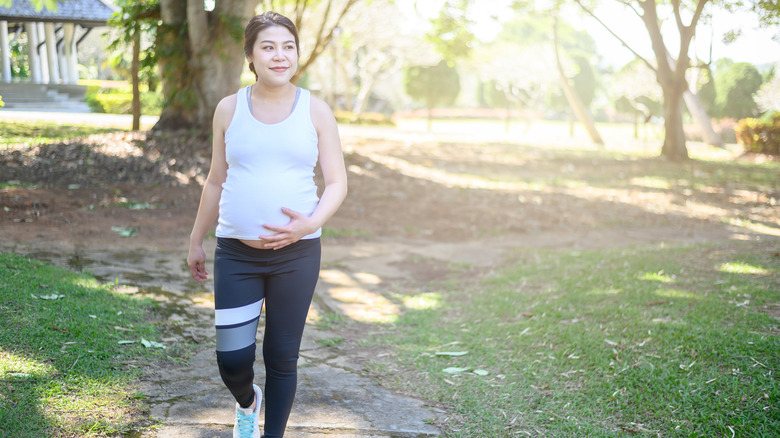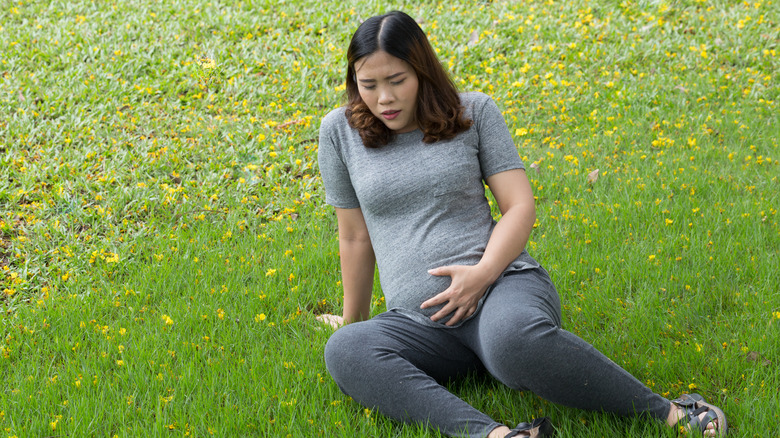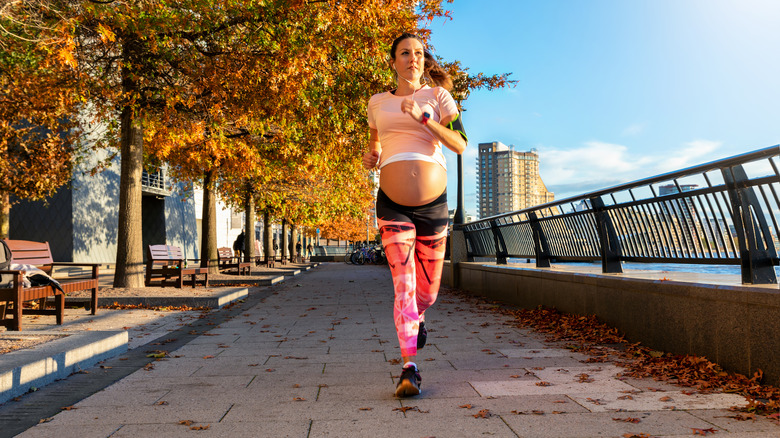7 Exercises You Can Do During Pregnancy And 7 To Avoid
Time and time again, exercise has been proven to provide huge benefits for expectant mothers (via Health). Not only does moderate exercise during pregnancy help boost the development of your precious bebe's brain, but it helps lower their risk of obesity and your risk of pregnancy-related diabetes, score! However, not all exercise is created equal, which is ultra-relevant when exercising during pregnancy. Even if you are an Olympic-level athlete, your doctor should give you the green light to pursue your pregnancy exercise regimen. As a general rule of thumb, experts advise pregnant women to stay away from exercises where their balance is compromised. But since all pregnant women have different experiences and bodies, it is best to check in with your doctor, especially if you consider beginning an entirely new exercise routine during your pregnancy.
Once you have consulted with your doctor, you'll discover that many exercises can be safely executed during pregnancy. While some sports and movements need to be bypassed because of safety concerns either for you or your baby, there are plenty of others that can be performed. Knowing what is safe for you and your baby-to-be will help you find the right exercise routine for your needs.
Do: Gentle yoga
There is a reason that it seems like every pregnant woman gets into yoga: It is an accessible way to move your changing and growing body, of course! Gentle yoga, specifically restorative and Hatha styles, can offer great health and wellness benefits for mamas-to-be (via Mayo Clinic). Some studios and gyms even offer prenatal yoga, which clearly means that the classes have been designed for pregnant women by well-trained instructors. Some of the wellness benefits of yoga include improved sleep and reduced stress, tension, and anxiety.
Beyond that, practicing yoga consistently throughout your pregnancy can increase the fitness of the muscles needed to successfully give birth. Yoga can increase these necessary muscles' endurance, strength, and flexibility. Yoga can also help combat some of pregnancy's more debilitating side effects like nausea, headaches, and shortness of breath.
If you opt to try out a non-prenatal yoga class, it is important to alert the instructor to your pregnancy so they can help you modify any poses that might be unsafe for you. With the right instructor, clearance from your doctor, and a willingness to listen to the sensations of your own body, there is no reason you won't be able to practice yoga throughout the entirety of your pregnancy.
Avoid: Closed twists and prone postures
Though the gentle forms can be beneficial, not all yoga is safe for pregnant women. If you are pregnant, you should definitely and irrevocably avoid hot yoga (per Mayo Clinic). In some cases, the room can reach well into triple digits, which can cause hyperthermia, a condition in which your body temperature skyrockets. These implications on pregnant women are harsh. Pregnant women should also avoid postures that require the body's weight to rest on the belly, also known as "prone" positions (via Power Yoga).
Postures such as cobra, where you ground your body through your pubic bone and take the weight through your hands, are safe but become less accessible as your body expands. Poses such as bow or locust, which require the entire weight of your body to be supported by the belly, are inherently dangerous for your fetus. Closed twists are also to be avoided when pregnant. Closed twists are essentially twists that require the entire body to twist and virtually compress the internal organs. These types of twists can restrict the blood flow to the baby. Instead, opt for open-style twists in which your baby belly faces forward, and the twist is mainly felt through the spinal column. A gentle, seated twist is a great example of a safe twisting posture to enjoy while pregnant, according to Power Yoga.
Do: Quadruped exercises
Quadruped exercises are a great stand-in for traditional core exercises while pregnant (via Bodies for Birth). Generally, movements that rely upon the rectus abdominis — think the muscle layer that gives you a six-pack — should be avoided during pregnancy. As your body expands to accommodate your ever-growing baby, this specific muscle gets put under a lot of strain. The last thing you need to do is add further strain by requiring it to actually exercise, ew. Instead, there are many core-strengthening exercises that look nothing like traditional sit-ups that you can do.
Quadruped exercises are those done on all fours. To find the correct alignment, spread your fingers wide and place your hands directly beneath your shoulders and your knees directly beneath your hips. You will endeavor to keep your spine neutral as you begin to move from this baseline position. Extending one leg behind you and the opposite arm in front of you and holding for 3-5 seconds is a great place to begin, alternating sides. If the balance is too challenging, a great way to modify is to skip the leg lift and alternate arm extensions while focusing on full, diaphragmatic breathing.
Avoid: Overhead weight-training moves
As with all exercises, it is important to check in with your doctor before performing them while pregnant. When it comes to weight training, things get particularly fuzzy. There are quite a few contraindications for weight training while pregnant. Still, overall, experts agree that expectant mothers should avoid performing overhead weight training movements (via Healthline).
You should avoid overhead weight training moves while pregnant because of the changes that occur within your postural support system. As your center of gravity shifts, so changes your posture. By continuing to lift heavy weights overhead, even if you were doing so pre-pregnancy, you run the risk of straining your lower back. This is not a huge issue during the first trimester, but it is best to stop overhead lifting as your baby begins to make itself known to the outside world. Instead of executing overhead presses, try reverse flies or front and lateral raises to target the shoulders. And as with all exercises during pregnancy, listen to your body. If you feel off-balance or any type of impingement or discomfort, modify what you are doing to accommodate the changes in your body.
Do: Swimming
The American College of Obstetrics and Gynecology cites swimming as one of the best forms of exercise a woman can do while pregnant. Since water naturally supports the weight of your body, swimming is a great choice because it lessens the likelihood of developing a muscle strain or over-exerting your muscles. Swimming is also incredibly low-impact, even compared to other low-impact activities like walking. Even though swimming is gentle on many aspects of the body, don't underestimate its benefit. Swimming throughout pregnancy can actually strengthen your muscles and aerobic capacity. Because of the support of the water, many women find swimming to be comfortable and enjoyable even late in their pregnancies. The weightless feeling that the water provides can also help ease many of the aches and pains accompanying pregnancy.
While swimming is considered incredibly safe while pregnant, you should always consult with your doctor before beginning a new exercise routine. Additionally, if you get nauseated or feel any abnormal pelvic pain while swimming, it is important to stop (via Healthline). To stay safe, avoid swimming in warm water so that your core body temperature doesn't rise too high, and remember that you might fatigue faster than you did before you were pregnant.
Avoid: Scuba diving
While swimming is a fantastic way to maintain your fitness while pregnant, scuba diving should be avoided. Interestingly, non-pregnant women can safely dive to the depths like a regular Ariel without any complications on their fertility; this has been proven in many peer-reviewed studies (via Seminars in Perinatology). However, pregnant women must refrain from scuba diving because of its strain on their developing fetus. While in utero, babies cannot regulate any issues caused by decompression. If an expectant mother dives and a decompression issue occurs, the baby could experience malformation or a gas embolism. A gas embolism occurs when an air bubble enters and blocks a vein or artery, which can be fatal (via NHS). Gas embolisms can also occur in adults who experience decompression sickness.
If you are a deep-sea queen wondering if it is safe to dive while expecting, the answer is no. Experts recommend sticking to snorkeling to ensure the health and safety of your unborn baby. If you happened to scuba dive before knowing you were pregnant, many studies indicate that your pregnancy can culminate in a healthy baby. However, it is imperative to contact your doctor if you find yourself in this situation.
Do: Planks
To avoid placing the six-pack-forming rectus abdominis under undue stress, planks and modified planks are a great way to build and maintain strength during pregnancy (via VeryWell Family). Provided your doctor okays your routine, you may want to undertake planking primarily because it strengthens the core, but it also strengthens secondary musculature. One of the best side effects of regular planking is that it can help strengthen the pelvic floor muscles, which can help decrease the frequent urination that is oh-so-common during pregnancy. The strength created through planking can also help ease pregnancy-induced back pain and potentially ease your birth and postpartum experiences.
As your pregnancy advances, it is important to listen to your body's cues and modify your movements to accommodate them. For example, during your second and third trimesters, you may feel like the weight of your belly is accentuating the curvature of your spine in a compression way. That is a great signal telling you to lower your knees for added support. You can also place your hands or elbows on a countertop or table for an incline plank if that suits your fancy. Fear not; you will gain strength and get a good workout even if you choose to modify your plank.
Avoid: Supine core exercises
It is advisable to skip traditional/supine core exercises because of the strain they place on the rectus abdominis (via VeryWell Family). This long muscle essentially runs the vertical length of your tummy. As your body changes, this muscle and many others are put under a lot of stress and strain as they accommodate the tiny human growing inside of you. The more strain this muscle endures, the higher your risk of developing diastasis recti, which is a separation of the ab muscle along the linea alba, or midline of the abdominals. Some degree of separation is super common during and after pregnancy, because as your body changes it produces more of a hormone called "relaxin," which is aptly named and causes your ligaments and joints to loosen. But you want to avoid a large or complete separation in these muscles, as that makes it harder to get them back to normal later on.
Aside from the heightened risk of developing diastasis recti, the supine position is notorious for being harmful to pregnant women and their unborn babies (via The Journal of Physiology). It can increase a woman's risk of hypotension, which is a fancy way of saying she might get low blood pressure. It can also reduce blood flow and, therefore, nutrients to the fetus. Unfortunately, new research suggests that women who sleep in the supine position have an elevated risk of stillbirth.
Do: Walking
Regular walking can offer many benefits during pregnancy without the risks of other activities (via Healthline). Walking is generally considered safe for both the mama and the babe, as it's a low-impact activity that doesn't compromise balance. Since the efforts and exertion can be regulated, it is a great way to stay active while growing a human inside of your body. In most cases, walking does not increase the likelihood of birth-related complications.
Walking can help strengthen your muscles, both in the pelvic region and posturally, which can help alleviate back pain during pregnancy and help ensure that you maintain a healthy body weight. Walking can also reduce the aches and pains that are common throughout pregnancy and help boost your mood. It is incredibly valuable to note that regular walking can help keep your digestive tract in motion and alleviate the horrors of pregnancy-induced constipation (if you know, you know). Al that said, as with all forms of exercise during pregnancy, contact your doctor immediately if you begin to experience symptoms that are out of the ordinary. And, of course, make sure that you drink plenty of water and wear good shoes as you walk your way into motherhood.
Avoid: Sports that put you at a high fall-risk
It is a fairly well-known fact that pregnant women should not be engaging in sports that increase their risk of falling (via WebMD). Even the best skiers and horseback riders are at risk of a life-altering fall. Any sport that requires jarring movements, rapid changes in direction, or can end in a tumble that could gravely injure a healthy, non-pregnant woman should be avoided during pregnancy.
Pregnant women have to endure a ton of changes to their bodies. These changes include their centers of gravity falling out of whack as their weight distribution and strength changes (via Nemours KidsHealth). Because of this, pregnant women are already at an increased risk of falling. This fact makes it pertinent to decrease the opportunities to fall during sport for the baby's safety. The female body protects the growing baby from these traumas as much as possible. However, as your belly expands, so lessens the abilities of your body to shield the baby from the force, especially if the force is applied directly to your abdomen. Falling onto your pregnant belly could result in the loss of amniotic fluid, fetomaternal hemorrhage, separation from the placenta from the uterine wall, and more (via Mayo Clinic). So when it comes to adrenaline-inducing sports during pregnancy, consult with your doctor to ensure that you aren't elevating your fall risk and putting you and your baby in harm's way.
Do: Jogging
In general terms, doctors often say that women who were runners before they fell pregnant can keep running throughout their pregnancies (per WebMD). As always, this is determined on a case-by-case basis, and you will need to consult with your doctor to ensure that jogging is a safe activity for you during your pregnancy. Typically, if you were not a runner or jogger before pregnancy, it is not advisable to start while pregnant. But if you have dabbled in jogging, it is a safe exercise to continue (in moderation, of course) if your body and doctor both agree that it feels right.
Women who jog during their pregnancies have lessened chances of developing cardiovascular and other complications, in addition to their generally easier birthing experiences. Additionally, pregnant women who exercise — and run specifically — have a 67% less chance of developing depression than those who don't. Mothers who exercise moderately throughout their pregnancies also expedite their babies' brain development compared to sedentary mothers.
The risks of moderate jogging while pregnant are pretty benign. Some women experience new aches and pains, a tactile sign to dial back your efforts. Furthermore, since your balance, joints, and ligaments are changing, you'll need to jog carefully to ensure you don't fall. Everything in moderation, after all.
Avoid: Contact sports
Much like avoiding sports with a heightened fall risk, it is valuable to avoid contact sports while pregnant (via WebMD). This is true even if you dominated the rugby field before becoming pregnant. During your first trimester, your embryo is fairly well-protected by the incredibly tough walls of the uterus. You can mostly get away with engaging in some contact sports during this time. However, most experts recommend opting out. Again, this is for you and your doctor to discuss and determine. There are no one-size-fits-all approaches to pregnancy, as each woman's body is wildly different from the next.
Once you reach your second and third trimesters of pregnancy, though, it is incredibly important to cheer your team on from the bench. Sports like soccer, rugby, hockey, basketball, etc., all come with an increased risk of taking a hit to the stomach, which can spell disaster for you and your unborn child. Much like falling, taking an aggressive blow to the stomach could cause the placenta to detach from the uterine wall, lead to a hemorrhage, or disrupt the delicate balance of amniotic fluid. In short, avoid contact sports during pregnancy to keep your baby safe and sound.
Do: Dancing and aerobics
Dancing and other low-impact aerobic exercises are a great choice for expectant mothers because they come with inherently low risk for you and your baby. Even if you are new to exercise, dance is a great way to get your blood pumping safely and effectively (via What to Expect). Dancing, and exercise in general, helps to get endorphins flowing through your body, which leads to greater feelings of happiness and well-being.
One of the best things about dance and aerobics during pregnancy is that they are both fully adaptable. If you are new to exercising, it is best to avoid jumping and high-impact moves while pregnant. Many non-pregnant people enjoy aerobics but avoid high-impact moves, so most instructors are well-versed in offering low-impact options. Beyond that, aquatic aerobics is totally a thing! So if shaking your groove thing while pregnant doesn't sound enticing, see if you can find a spot that offers water aerobics.
Bear in mind that your balance changes as your body does — so avoid attempting new and advanced moves while pregnant. Aside from that, dancing and aerobics are great, safe options to help you feel your best during your pregnancy.
Avoid: Skydiving
More information is needed to fully understand the effects that changes in oxygen saturation and the stress of skydiving can have on an unborn baby (via Journal of Clinical Sports Medicine). However, many women who have experience with skydiving continue to opt IN while pregnant. Studies have shown that these women have gone on to have healthy pregnancies and babies. But most institutions will not allow inexperienced skydivers to take to the sky while pregnant because of how catastrophic an accident could be.
Studies have repeatedly proven that injuries during pregnancy can lead to horrible outcomes, and skydiving injuries clearly have the potential to be fatal. Given this, experts advise women to avoid skydiving during pregnancy. Instead, they recommend wind tunnel training, which has been proven to be safe for most women while pregnant, according to a review published in the Journal of Clinical Sports Medicine. As with all other exercises and activities, consult with your doctor so you can make an informed decision regarding the health of your body and future baby.















